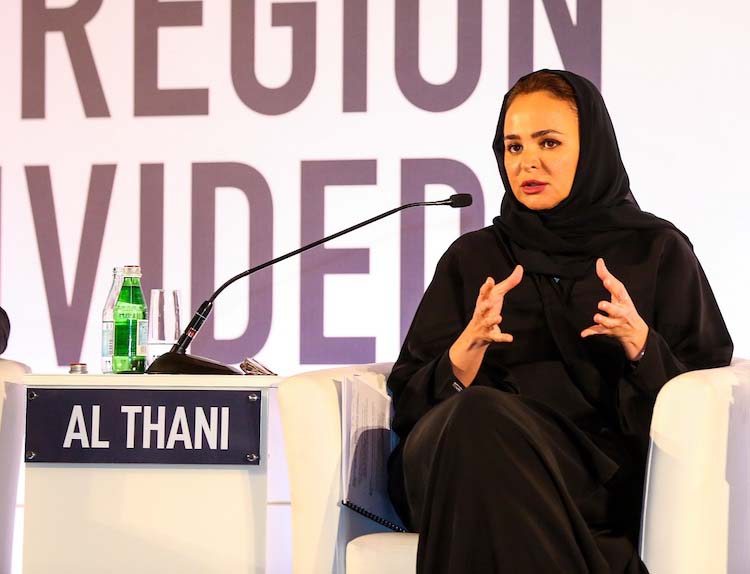Qatar youth in the GCC are overwhelmingly positive about their future and believe their government is putting the right policies in place to address their needs, according to findings from the 9th annual ASDA’A Burson-Marsteller Arab Youth Survey 2017 released recently.
An overwhelming majority – 96% – of Qatari youth said they believe the country has been heading in the right direction over the past five years, while 86% were confident the government is developing the right policies focused on the youth.
Sheikha Hanadi Al Thani, Founder and Chairperson of Amwal, participated in the panel discussion at the launch event, focusing her remarks on education and unemployment.
In the GCC states, 85% of young people are confident that their country has been heading in the right direction over the past five years compared with 52% for Arab youth across the region. Three quarters – 78% – of GCC youth also believe their ‘best days are ahead of them’ compared to 58% for Arab youth as a whole; and 82% of young people in the GCC believe their economy is on the right track versus 52% on a region-wide basis.
86% of Gulf youth believe their governments are putting the right policies in place that will benefit young people – an opinion held by only 57% of young Arabs across the whole Middle East.
Sunil John, Founder & CEO of ASDA’A Burson-Marsteller, said that the findings from this year’s survey are encouraging, given that not only are young people optimistic about the future, they also have confidence that their governments are doing the right things for them.
This is not the story from the rest of the region. The positivity and optimism of the Gulf youth are a real bright spot in the Middle East today, but one that also highlights a growing trend of a ‘polarisation’ of views, inspiring the main theme of this year’s survey: The Middle East – A Region Divided.’
Roy Haddad, Director of WPP MENA, said the survey provides a voice to the voiceless, and allows young Arabs to be heard around the world.
It allows us to hear what Arab youth think and feel about their past, present and future. As such, it is an invaluable tool for businesses and governments, and civil society in general, who need accurate data and insights about this most important demographic.’
The Survey reveals that in 2017, support for the US has fallen markedly: 17% of young Arabs see US as their most important ally, down 8 percentage points from 2016 and, for the first time, more young people see Russia as their top international ally – an increase of 12 percentage points from 2016.
The threat posed by Daesh – viewed last year as the number one issue facing the Middle East – is seen as diminishing, this year tying with unemployment as a top concern for 35% of the region’s young people. Most young Arabs (61%) also believe the terror group is getting weaker; and across the region, young people think education reform and well-paying jobs are just as important as military action in defeating terror and extremism.
Other key findings from the ASDA’A Burson-Marsteller Arab Youth Survey 2017:
Many young Arabs say their education system falls short of preparing students for future jobs
The quality of education is a cause of concern for young Arabs, particularly in non-GCC nations. Nearly half the Arab youth say they are not satisfied with the current level of preparation. Of the 51% who say they are satisfied that the current education system is preparing them for future roles, most are from the GCC nations (80%) while those least satisfied hail from North Africa (33%) and the Levant and Yemen (34%).
The UAE is the country where most young Arabs would like to live and want their countries to emulate
The United Arab Emirates cemented its position as the country most young Arabs would like to live in and would most like their own countries to take after. This year, one in three (35%) young Arabs say they like to live in the UAE, a significant increase of 13 percentage points from last year. Asked which country they would like their own country to emulate, the UAE again comes on top, with more than a third of young Arabs (36%) saying the UAE is their model country, compared with one in four last year.
Young Arabs say Donald Trump is anti-Muslim
Attitude towards the election and presidency of Donald Trump are largely negative, with two thirds of young Arabs (64%) either concerned, scared or angry about Trump taking the helm of the world’s most powerful country. Furthermore, 70% of young Arabs say Trump is anti-Muslim and half (49%) agree that Trump’s travel ban imposed on Muslim-majority countries would make it easier for extremist groups to radicalise and recruit young Muslims.
Most young Arabs say they use English more than Arabic in their daily lives
While 80% of young Arabs agree to the statement ‘Arabic is central to my national identity.’ Yet, 60% of young Arabs agree that Arabic is losing value and, for the first time, more than half of young Arabs (54%) say they are using English more than Arabic in their daily lives (up from 46% in 2016).
Facebook is the number one medium for daily news among young Arabs
More than a third (35%) of young people in the Arab world say they get their news on Facebook daily, compared with 31% for other online news sources, 30% for TV news channels, and just 9% read newspapers daily. Two-thirds (64%) say they use Facebook to share news stories, up from 52% in 2016 and 41% in 2015.






